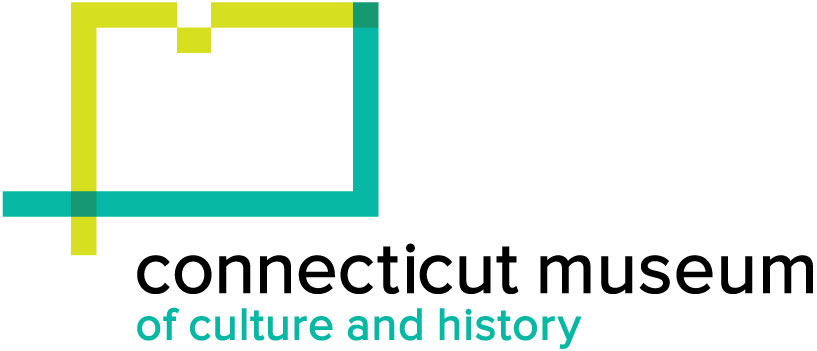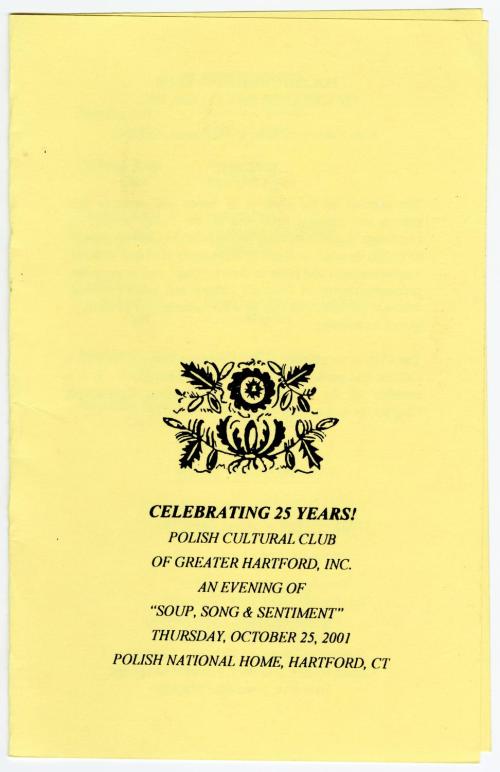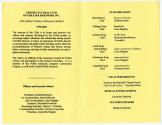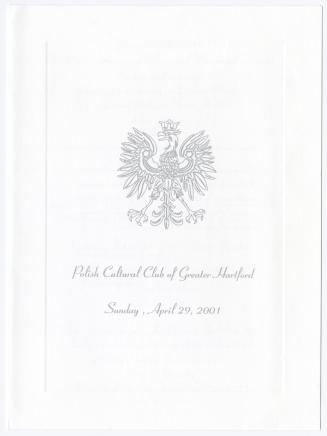25th Anniversary of Polish Cultural Club of Greater Hartford, 2001
Date2001
Mediumpaper
ClassificationsInformation Artifacts
Credit LineConnecticut Cultural Heritage Arts Program collections
CopyrightIn Copyright
Object number2015.196.88.23-.24
Description2015.196.88.23: Program for the 25th Anniversary Celebration of the Polish Cultural Club of Greater Hartford, 2001
2015.196.88.24: Flyer for the 25th Anniversary celebration of the Polish Cultural Club of Greater Hartford, 2001
NotesSubject Note: The Polish Cultural Club of Greater Hartford “was established in 1976 to preserve and promote the history, culture, and customs of Poland with fellow Americans." An active organization that has held many meetings at the Polish National Home on Charter Oak Avenue in Hartford, the Club sponsors lectures, seasonal celebrations such as Wigilia at Christmas time, the annual szopka festival, and gives scholarships and support to Scouts groups. The Club collaborates with the Polish Foundation and the CCSU Polish Studies Department and Library in New Britain.2015.196.88.24: Flyer for the 25th Anniversary celebration of the Polish Cultural Club of Greater Hartford, 2001
Subject Note: The Polish community comprises nearly 10% of the state’s population, settling here during the late 19th and early 20th centuries when New England’s industrial growth made jobs plentiful in mills and factories. Thousands from rural areas of Poland left behind difficult political and economic circumstances to work in America. A similar movement of people took place in the 1980s, and Polish newcomers continue to arrive, bringing a very different sense of “Polishness” and cultural tastes from the older immigrants. Uprooted from their homeland and all that is familiar, these new Americans have found refuge in maintaining traditional customs, beliefs, foods, language, and joining together in fraternal, cultural, political, academic, and veterans societies. Parish churches fill a very important function as centers for social organization and cultural unity as well as providing spiritual and emotional comfort. The Polish saying Co kraj, to obyczaj explains that in the American Polish communities called Polonia some of the old practices change to fit new circumstances, or disappear altogether among recent generations.
The seasonal round of celebrations, festivals, holidays, along with the activities and art forms associated with them, connect Polish Americans to a dimension of beauty, meaning, spirituality, and heritage which they remember from the past but also practice today. In Connecticut works of art and everyday objects for use in the home are still made by hand in traditional Polish styles. Older objects from Poland are often redecorated with materials found here, and the process of creating and using these pieces shows an active expression of identity, not a mere recreation of old folk art forms.
New Britain, the center of Polonia in Connecticut, has a longstanding language school and folk dance group. Central Connecticut State University hosts the Polish and Polish American Studies Program and Library – one of only two such programs in the country. Broad Street is a thriving center of Polish commerce and activity, and has hosted an annual festival since 2012 called “Little Poland.” The festival is held in late April to mark Poland’s Constitution Day, a celebration of the democracy enjoyed by Americans under their country’s Constitution. In Hartford, the historically Polish neighborhood around Wyllys St/Popieluszko Court/Charter Oak Avenue included SS Cyril and Methodius Church, the Church School, the Polish National Home, and several businesses.
Community celebrations and seasonal holidays often follow the liturgical calendar of the Church. Christmas is celebrated with Pasterka, the midnight mass of the shepherds when koledy, holy carols, are sung. On the Feast of Epiphany, chalk is blessed in the church and used to inscribe door lintels with K + M + B, the initials of the three kings. At Easter, baskets of food for the Easter breakfast are blessed in the church. Processions mark Corpus Christi, the Feast of the Blessed Sacrament (and a ritual to ensure good crops) in June. In the late summer, harvest festivals called Dożynki featuring an open-air or church Mass with a blessing and distribution of bread, folk dancing, craft and food vendors are held in New Britain, Bristol, and Bridgeport/Ansonia. Harvest ornaments, large structures of wheat sheafs decorated with flowers and ribbons, are made and displayed by community artists. On All Souls Day in November Polish families visit the graves of their relatives, decorating them with candles and flowers after an outdoor mass.
Subject Note: Towarzystwi/Associations - Polish Americans have regularly formed numerous types of associations, Towarzystwi, which functioned as mutual aid societies, as clubs to pursue common interests, as places to meet for socializing or for community work, and as a patriotic statement. The primary institution was the parish church, a center of tradition, education, and Polish heritage as well as spirituality. Many groups, especially women’s auxiliaries, were associated with the church and served to extend its work throughout the parish. Based on similar cooperatives in rural Poland, immigrants here established fraternal organizations to provide group insurance and other benefits such as burial for members of the community. Other types of organizations included library clubs, folk dance groups, singing societies, Boy and Girl Scout troops, veterans halls, and Polish National Homes in many cities. Local branches of nationwide political groups met to promote their causes, often resulting in factions. Even so, parades, rallies, and special days commemorating events from Polish history brought Polonia together in an expression of patriotic solidarity not possible in the homeland. In addition to performing valuable services throughout Polonia, these societies and clubs had the effect of maintaining an active expression of Polish language and identity.
As subsequent generations have spread out from close urban neighborhoods into the suburbs, the Polish Saturday School has been established as a way to teach children Polish language, history, and traditions. Teachers are often new immigrants from Poland who bring a fresh sense of Polish character, values, and heritage. Polish cultural clubs today serve to bring people together socially while sponsoring projects such as collecting food for distressed neighborhoods, educating non-Polish audiences about Polish culture, offering scholarships to Polish American students, and supporting activities both in Poland and Polonia. National organizations with local chapters such as the Polish American Alliance and the Polish American Congress successfully petitioned NATO to include Poland among its members. The Endowed Chair in Polish and Polish American Studies at Central Connecticut State University has received strong financial support from many community-based organizations throughout Polonia that share its goal of education and are proud to have it in Connecticut.
Additional materials exist in the CCHAP archive for this community and this organization.
Cataloging Note: This project was made possible in part by the Institute of Museum and Library Services MA-245929-OMS-20.
Status
Not on view
















